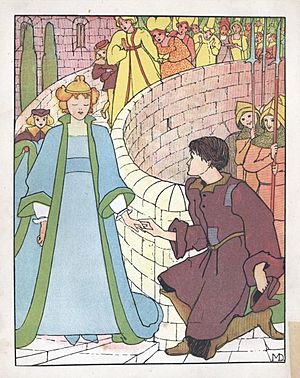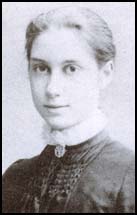The Little Princess and the Poet facts for kids
The Little Princess and the Poet is a fairytale written by Evelyn Sharp in 1898. This short story for children teaches an important lesson. It shows that true beauty is not just on the outside. Instead, real beauty comes from a person's heart. The story is part of Sharp's well-known collection called All the Way to Fairyland.
Contents
Story Summary: The Poet's Journey
Once, there was a poet who spent all his time writing poems. He was not very good-looking. Because of this, people often sent him away. They did not like to look at his face. So, the poet traveled from town to town. He sang his poems, but no one really listened.
One day, the poet came to a new city. As always, he went to the poor people first. He always wrote about their lives. But they complained, saying they already knew about their troubles. They told him to go to the palace instead. The Princess there was blind and loved listening to poetry all day.
The Poet Meets the Princess
The poet was thrilled to be wanted somewhere. He rushed to the palace. The guards at the gate tried to turn him away. They thought he was not as handsome as other poets. But the Princess heard him at the gate. She felt that he was a true poet. He was different from the many princes who just pretended to write poems.
The Princess took the poet's hand. She led him into the palace. The King and Queen were not happy to see him. They tried to make the Princess send him away. But the Princess insisted that he stay.
A Special Poem and a Cure
During lunch, the poet sang a poem. It was about the poor and their hard lives. Everyone was amazed when he finished. The forty-five princes who called themselves poets left. They knew they were not real poets. The Queen tried again to make the poet leave. She said he was not good company for a Princess. The poet knew she was right and told the Princess he had to go.
The poet went back to traveling. One day, far from the Princess, he sang about his love for her. The poor people told him something amazing. If he kissed the Princess's eyelids while she slept, her blindness would be cured. She had been blind since birth.
Finding True Beauty
The poet quickly returned to the palace. He told the King and Queen why he was there. They were unsure but also curious. They agreed to let him try. But he had to leave right after kissing her. Luckily, the Princess was asleep in the garden. The poet kissed her eyelids.
When she woke up, the Princess could see! She wanted to see all the beauty she had missed. But nothing in the palace looked beautiful to her. She decided she wanted to see something ugly instead. People told her there was nothing ugly in the palace. So, the Princess went outside. She saw the poet, who had not been able to stay away. Looking at him, she finally found true beauty.
About Evelyn Sharp: Author and Activist
Evelyn Sharp was born on August 4, 1869, in London. She came from a wealthy family. She was the ninth of eleven children. Her older sisters taught her before she went to school. Later, she studied in Paris in 1890.
Evelyn Sharp is famous for her children's stories. She was also a strong supporter of women's right to vote. People called these supporters "suffragists." Sharp wrote many types of stories. Her schoolgirl tales were based on her happy school days. She wrote these in her book The Youngest Girl in the School.
In her fairytales, Sharp connected with children's minds. She treated children with respect. She saw them as creative and smart. Her stories showed this. She understood children well. She often thought adults were strange or didn't make sense. Her fairytales did not just teach lessons. They also talked about important issues of her time. These included ideas about gender, social classes, and peace.
Sharp also worked as a journalist for the Manchester Guardian newspaper for forty years. She was the first regular writer for its popular Women's page. Her work for women's voting rights began before the First World War. Sharp was part of two main suffragist groups in Britain. One was the Women's Social and Political Union. The other was the United Suffragists, which she helped start. She also edited a newspaper called Votes for Women.
Sharp also worked for peace and helped people around the world. In the 1920s, she worked with the Quakers in Weimar Germany. She was put in prison twice for her beliefs. She also refused to pay taxes. She believed that if she couldn't vote, she shouldn't have to pay taxes. When she was sixty-three, she married her long-time friend, Henry Nevinson, who was also a suffragist. Evelyn Sharp passed away in 1955 at the age of 86.



